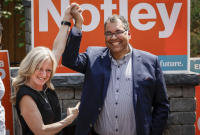Support strong Canadian climate journalism for 2025
Gas giant Enbridge is urging shareholders to reject climate-related resolutions at its upcoming annual meeting, according to filings published this week.
Two separate resolutions call on Enbridge to improve its climate performance at the shareholder meeting, scheduled for May 8.
One resolution submitted by the charity DI Foundation, and represented by Investors for Paris Compliance (I4PC), requests that Enbridge disclose all of its “material Scope 3 emissions,” referring to the planet-warming greenhouse gas emissions created when the gas it sells is burned.
The other resolution was filed by Leanne Baer, represented by Environmental Defence, accusing Enbridge of a pattern of spreading false and misleading statements about the climate and environmental impacts of its business. Environmental Defence contends Enbridge is violating its business conduct standards, which require it to be truthful and accurate. And the resolution calls on the company to review and report on its “governance systems” to ensure misleading statements are published.
Enbridge fiercely rejects these proposals and told shareholders that responding to these groups is “time-consuming and distracting” and hurts long-term shareholder value.
“These activists acquire the minimum position of shares in a company required to bring forward a proposal solely for the purpose of campaigning for change — and take positions that are diametrically opposed to the company’s business,” Enbridge wrote in a document for shareholders. “They don’t engage with the company in any genuine way and their interests are not aligned with the vast majority of the company’s investors because their focus is on generating publicity, not on meaningful engagement as shareholders.”
Environmental Defence’s proposal is misusing “this platform to oppose Enbridge’s business and operations and to bolster its other anti-Enbridge proceedings,” the company document states.
The resolution from Environmental Defence points to several claims from Enbridge as evidence of misleading or false statements, including that gas is the most affordable energy option as a justification for its gas infrastructure expansion plans despite evidence showing heat pumps are cheaper over the life of the equipment.
Following a complaint by Environmental Defence, Ontario Clean Air Alliance, the Canadian Association of Physicians for the Environment and a group of Ontario residents, Competition Bureau Canada launched an investigation into Enbridge over potentially deceptive marketing practices stemming from its claims about the role of gas in the energy transition.
Environmental Defence cited Canada’s National Observer reporting in its resolution, which Enbridge urged shareholders to reject. The shareholder resolution “relies on two articles in a biased media source,” the company said. However, Enbridge did not point to any inaccurate information, did not request any corrections to the articles cited and did not return a request for comment. Canada’s National Observer did offer Enbridge space to respond to one of the articles referenced with a letter to the editor.
The proposal from I4PC essentially accuses Enbridge of hiding its total emissions from investors by using substandard reporting methods.
“Enbridge’s current Scope 3 emissions disclosure methodology runs counter to guidance by the [Carbon Disclosure Project], the GHG Protocol, and investor-led Climate Engagement Canada, leading to a large underreporting of Scope 3 emissions and by extension, its transition risk,” the resolution reads.
That’s a major problem according to I4PC because Enbridge’s business model — transporting and selling gas — inherently involves planet-warming emissions. If those emissions are not properly disclosed, investors are kept in the dark about the company’s climate performance and the risks to the business.
This “is the third year in a row that I4PC has submitted a proposal that deals with Scope 3 [greenhouse gas] emissions, in which their anti-oil and gas sentiment is evident,” Enbridge told shareholders.
I4PC calculated Enbridge’s Scope 3 emissions using publicly available data and found the emissions have grown 76 per cent since 2014, reaching 805 million tonnes last year. That figure is 20 times higher than Enbridge currently reports, I4PC said in a statement.
If Enbridge moves forward on its planned projects, it will add an additional 217 million tonnes, I4PC said.

“A company dramatically adding Scope 3 emissions is a company going in the opposite direction of the energy transition,” said I4PC director of corporate engagement Duncan Kenyon. “Enbridge claims to be dealing with Scope 3 emissions with a few renewables projects and consumer conservation programs, but those gains are absolutely dwarfed by the losses from the company’s fossil fuel expansions.”
Enbridge called the proposal “unusual and misleading” in its guidance to shareholders, urging them to vote the resolution down.
The shareholder resolutions come as Enbridge attempts to defend its gas business as climate concerns increasingly take priority with regulators. The company has written letters to municipalities asking them to help push back against a decision by the Ontario Energy Board (OEB) that threatened the company’s bottom line.
After a year of expert testimonies, thousands of pages of evidence and a series of reports, the OEB found Enbridge is at risk through the energy transition and ordered that new gas infrastructure be paid for upfront rather than stretching the cost out over decades. The Ontario government has since tabled legislation to kneecap the independent regulator’s decision in a move that helps protect Enbridge’s profits at the expense of gas customers.






Comments
Activist shareholders may be just a few flies in the Big Slurpees of Enbridge, but the lowly heat pump may well be the scorpion that knocks it flat on its back.
Regardless of the emissions Canadians need to heat their homes.
until there is a viable alternative (electric heat pumps) at a reasonable price and a realistic transitional time line brought forward.
Gas will be the choice until that becomes just too expensive.
No one is going to shut down billions in profit without a huge fight.